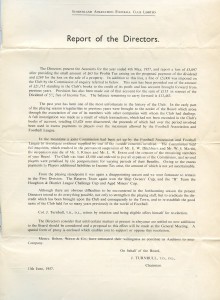The Illegal Payments Scandal 1957
Sunderland AFC
Introduction
To understand the illegal payments scandal of 1957 there must be an understanding of what the Football League rules were as regards what was known as the maximum wage. As we shall see it was Sunderland’s breaking of this written rule that would spawn a major investigation that would have major ramifications for the football club and subsequently lead to The Black Cats first ever relegation.
Regulation 59 (a), Maximum Wage, of the Football League, published in its 1938 Jubilee publication, stated that:
“The maximum wage, except as hereinafter provided shall be £5 per week, with annual rises of £1 per week to a maximum of £6 per week during the close season and £8 per week during the close season. A player, whose registration is transferred from one club to another, may be paid the rate of wages he is receiving at the time of transfer”.
Put simply in 1938 the maximum wage payable to a professional footballer within the pyramid of the Football League was £8 per week. By the 1950’s this figure had risen to £15 with a maximum signing on fee of £10.
To place this into context with other countries, in 1956 Eddie Firmani was transferred from Charlton Athletic to Sampdoria in Italy. He received a lump sum of £5,000, was paid a wage of £100 per week, made use of a luxury flat and was a free agent just two years later.
The maximum wage imposed by the football League was an obvious sham.
To get round the maximum wage it was well known within English footballing circles that players received “under the counter payments” from clubs. This was brought to prominence ironically in the autobiography of Sunderland legend Trevor Ford. In the 1957 publication “I Lead The Attack” in which the first chapter was entitled “Under The Counter” he gave support to a proposal by then Manchester City Chairman Bob Smith for an amnesty in which a sensible discussion could take place regarding a footballer’s maximum wage payable.
His ideas were rejected out of hand, including rejection by Sunderland AFC.
Ray Daniel, Trevor Ford, Jimmy Cowan, Billy Elliott and Len Shackleton walk in Roker Park 1953. Daniel, Ford and Elliott were caught up one way or another in the illegal payments scandal.
Sunderland AFC – “Mr Smith”
In January 1957 a letter, signed by a “Mr Smith” (no relation to the gent from Manchester City) made allegations about under the counter payments by Sunderland AFC.
Both The Daily Express and The People newspapers would see the letter and the Express later commented that “Smith gives enough facts to show he is well acquainted with the Sunderland club and that his object is the punishment of individuals”.
Two theories have emerged as to who it was who decided to make an example of Sunderland AFC:
· A disgruntled Director. Rumours became rife that there was an internal power struggle at Sunderland AFC. The Board of Directors at the 30 May 1956 (at the time of the last year end accounts) were given as: EW Ditchburn (Chairman), Col J Turnbull, S Ritson (Vice Chairman), LW Evans, SS Collings, J Reed, WS Martin and J Parker. The Daily Express revealed that in one of the letters to the Football League that they saw 2 of the Directors had threatened to demand an inquiry unless two of their fellow Directors resigned.
· A jealous player. If Trevor Ford was to be believed it was obvious that some of the Sunderland players were alleged to be on far more money than was being disclosed. That being the case it was put forward that it could have been a fellow player, jealous at the amount of money being paid to some of the clubs players. At that time Sunderland were known as The Bank Of England club due to the high transfer fees that they paid for their players.
Whatever the motives and whoever it was Alan Hardaker, then Secretary of the Football League opened up an inquiry into the matter.
On the verge of giving up on the issue as that of a disgruntled prankster a final look at the clubs accounts revealed a pencil note on the draft accounts asking “where do I post this?” The figure, for the purchase of straw amounted to around £3,000. At the time there was no undersoil heating at football grounds and in order to ward off snow and particularly ice, football clubs would cover the pitch with straw in the winter.
Looking at the clubs accounts it is noticeable that the Ground Maintenance Account, part of the General Revenue Account, presumably where “straw” would be coded, doubled from May 1952 (£5,092) to May 1956 (£10,754).
Hardaker immediately telephoned his brother Ernest who was chairman of Hull Rugby League Club and in his autobiography recounted the contents of the conversation:
“How much does it cost to cover your ground with straw in a normal sort of winter?”
“It would depend on how many Saturday’s were involved” Ernest replied.
“Well” said Hardaker, “if I gave you £3,000 would you be able to mange for a season?”
“Blow me” Ernest answered, “For that we’d manage 25 seasons”.
Sunderland’s cover was blown wide open.
Sunderland’s scam was simple. They had placed orders for both straw and tarmac, far in excess of what was required. When the suppliers came to deliver the items they gave credit notes to SAFC for the amounts returned; in turn SAFC cashed the credit notes in with the suppliers and used the cash to pay their players over and above the permitted maximum wage. In effect under the counter payments.
It was determined that the practice had been going on for 5 years and amounted to £5,217. Ted Ditchburn the SAFC Chairman at the time admitted sole responsibility although disclosed that his close friend Bill Martin also knew about this practice. In fear of being found out it was later discovered that Ditchburn had paid £2,700 back into the clubs accounts to try and hide some of the illegal payments.
Trevor Ford, who refused to retract the allegations he made in his autobiography was banned sine die (forever) by the Football League but had this ban retracted and subsequently signed for PSV Eindhoven in Holland in March 1957.
On 10 April 1957 the Football League made its ruling into the affair.
Sunderland were fined £5,000 which was the biggest fine ever issued to a football club. The previous record, ironically, had been given to Newcastle United in 1924 for fielding a weakened team just before their FA Cup final match.
Three of the Directors were barred from football sine die, including Ditchburn and the Vice Chairman. The rest of the Board were severely censured.
Worse was to follow. On 25 April 1957 five Sunderland players were hauled in front of an FA Commission to answer for their part in the scandal, Ray Daniel, Ken Chisholm, Billy Elliott, Willie Fraser and Johnny Hannigan. On the instructions of the PFA lawyers all five remained silent and in doing so condemned themselves to sine die bans.
A long and protracted saga followed and in the end the five players in question admitted to receiving under the counter payments. Their sine die bans were lifted and lesser sanctions were imposed. However the damage was done.
Bill Murray the Sunderland Manager was fined. However one month later he resigned, ending a 28 year association with his beloved Sunderland AFC.
The saga still rumbled on for another 5 years and eventually in April 1962, with the maximum wage now abolished, the High Court in London ruled that the FA and Football League had no power to act as they did.
Sunderland AFC lay in tatters; for nothing.
1956/57 Sunderland AFC Accounts includes the Report of the Directors detailing events surrounding the illegal payments scandal
Summary
Within 1 year of the initial suspensions and fines Sunderland were relegated for the first time in their long and then illustrious history. A club humbled and embarrassed. The heart of an institution had been ripped out.
By May 1957 the club had just 4 Directors. Col Turnbull had taken over as Chairman and along with Collings, Reed and Parker; they were left to pick up the pieces. The clubs annual report and accounts goes into some detail about the commission and a provision was made in the accounts indicating that although a true and fair view they were subject to investigation. Due to the excess payments to players additional liabilities to income tax arose, however at that time the amount had not been ascertained.
Whilst it is moot to point out that since that time successive Boards at Sunderland AFC may well have made mistakes and many wounds were self inflicted, the catalyst for a great clubs demise was clear.
It wasn’t as if we were the only ones making illegal payments; however it looks, amazingly, as though the club was brought to its knees by an insider.
Perhaps the biggest own goal in football history.







